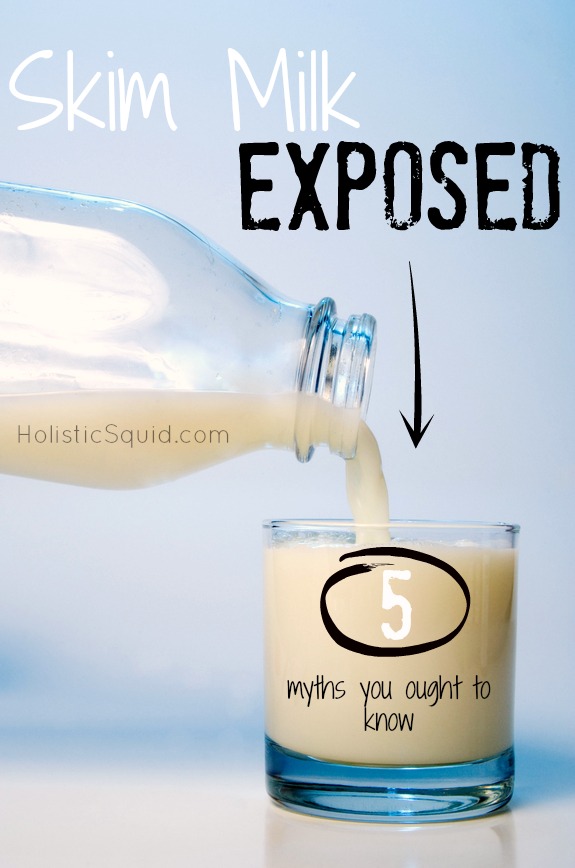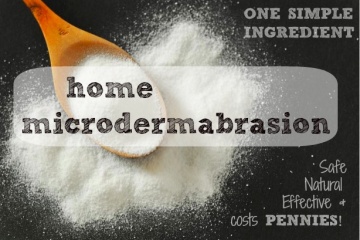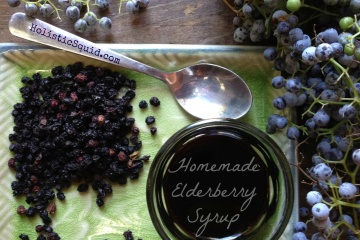
A couple of weeks ago I broke the big news that cereal is junk food. All of it. Even your high fiber oat flakes. Next up to bat: skim milk (or for that matter 1% or 2% too).
There are so many topics to discuss when it comes to milk: organic vs. conventional, pasteurized vs. raw, grass-fed vs. grain-fed cows, homogenization, and whether to drink milk at all. Today we're mostly focusing on the myths and facts of skim and low fat versus whole fat milk, but you can read about many of the other issues here.
SKIM MILK MYTH #1: Organic skim milk is part of my healthy diet – the USDA says so too!
FACT: Your skim milk, organic or not, is a highly processed food. When your milk is pasteurized it undergoes high heat, killing all the microbes, good and bad. This leaves the milk inert and toxic to the human digestive tract leading to lactose intolerance, allergies, and a whole host of other issues.
Homogenization makes the milk a uniform thickness by putting the milk though a high pressure process to reduce the size of the fat particles. This process puts the milk at risk of rancidity.
Finally, the skimming process not only strips the milk of essential saturated fats, fat-soluble vitamins A, D, and K2 and healthy cholesterol; but also most reduced fat milks have powdered non-fat milk added which contributes toxic nitrates and oxidized cholesterol.
Up until WWII, skim milk was consider an inferior, undesirable product, and has since gone in and out of popularity seemingly based on political agenda. This is one of the many reasons I don't tend to put much stock in nutritional advice from the government.
SKIM MILK MYTH #2: Non-fat or low fat milk is preferred to their evil full-fat sister, because saturated fat causes heart disease and other health issues.
FACT: I've said this before, but it surely bears repeating – saturated fats are essential for health, are not the cause of disease, and are, in fact, a health food!
If you're a “show-me-the-studies” kind of person:
- Diets high in saturated fat actually have been shown to increase HDL, the “good” cholesterol and not affect LDL, the “bad” cholesterol (Journal of American College of Nutrition, 2004).
- Cholesterol does not clog arteries, and is essential for many functions in the body, including hormone production and regulation, proper digestion, and immune health.
- A fairly recent study actually shows that lowering cholesterol has no affect on plaque build-up in the arteries (American Journal of Cardiology, 2003).
The modern epidemic of heart disease should not be blamed on full fat milk, high- quality bacon, and delicious butter, but on unhealthy vegetable fats such as margarine, canola, corn, and soy oils as well as the groceries' aisles of other processed foods.
As mentioned above, reduced fat milks also contain dried milk powder (producers aren't required to label as such since it is a form of milk). Milk powder contains oxidized cholesterol, which is essentially rancid cholesterol that absolutely contributes to heart disease and other serious health conditions.
SKIM MILK MYTH #3: I drink skim milk because I want to stay thin.
FACT: Eating anything in excess will make you fat, but the reality is, when you eat nutrient dense foods rich in saturated fat, your body will become satiated faster and for a longer period of time than when you eat low-fat, nutrient deficient foods like a bowl of cereal with skim milk or an apple with fat-free cheese. It tends to be the carbs, sugar, and processed foods that make us fat because we can eat and eat and eat them and never feel satisfied for long, so we eat and eat some more.
So by all means, drink full fat organic milk and use real cream in soups and sauces. Your body will thank your for the nutrients, and if you've got curves when you look in the mirror, then blame your cereal, toast, pasta, and cake – not the fats.
SKIM MILK MYTH #4: I get all the calcium I need from skim milk plus essential vitamin D.
FACT: Skim milk will leave you skimped on nutrition. While skim milk may contain calcium, it is missing the fat and cholesterol you need to assimilate the nutrients in milk. The vitamin D that fortifies most commerical milk is D2, known to be toxic to the liver. Cream from grass-fed cows naturally contains vitamins D3, A, and K2 – fat soluble vitamins in their natural form that are essential to good health. Simply put, full-fat milk from grass-fed cows will provide you with the nutrition you need, not skim.
SKIM MILK CONUNDRUM: Nevermind. This is too confusing. I'm going to skip cow's milk altogether and go with soy, rice, or almond milk.
SOLUTION: Soy is not a good food for human consumption unless it's been fermented (as is traditionally made soy sauce or tempeh). Read why here. Even unsweetened packaged milk-alternatives contain lots of added sugar and preservatives. Real milk from grass-fed cows is a nutrient-dense, traditional health food. Ideally, this milk will be unpasteurized and non-homogenized. You can find out more about the benefits of raw milk from pastured cows here.
So, in order of best to worst:
- Full-fat (whole) raw milk from grass-fed cows raised on pasture – drink it in abundance if it feels good in your body.
- Pasteurized full-fat (whole) organic milk from grass-fed cows raised on pasture – if raw isn't available.
- Pasteurized, homogenized full-fat (whole) organic milk from grass-fed cows raised on pasture.
- Homemade “nut” milks (coconut, almond, cashew, etc.)- If your system can't tolerate dairy or you don't have access to milk from grass-fed cows.
Avoid all (in no particular order):
- Non-organic milk
- Ultra-pasteurized milk and cream
- Reduced fat and non-fat milk and dairy products
- All soy milk
- Packaged rice, oat or nut milks
Still have Q's about skim milk? Ask below!












I just don’t buy that dairy in any form is healthy. Why do humans drink milk from other species? Especially ones whose biological make up is so different from ours? I want to do what’s healthy and have heard about this raw milk thing, but what about skipping it all together? Are there better sources of B12 and calcium? What about all the diseases dairy can cause including heart disease and cancer? But you say i can drink raw milk in abundance? I’m so confused.
Hi Rachel – I used to share the same confusion. Humans have been consuming milk from other animals for over 10,000 years. I think the issue is less about milk in general, and more about how the cows are raised and fed and how the milk is processed.Good quality milk (unpasteurized, whole milk from cows that graze on pasture) is a wonderful nutrient dense food that does not contribute to disease, but rather fortifies the immune system. The Vitamin D, A, and K2 from milk you simply cannot get from plant sources. This post may help answer some of your questions: http://www.holistickid.com/milk-hero-or-villian/. Thanks for reading! 🙂
What’s wrong with Organic Rice Milk? My son has had eczema and has been that “snotty kid” from about 6months til 1 year and a half or so. Switching to rice milk seemed to help with the phlegm. I’ve been thinking about going back to whole milk, especially since my youngest son is almost a year and getting ready to go to milk. Also, where can I buy whole raw milk? I know Henry’s and Whole Foods have stopped selling it. Ps. Thank you for all of this information!
Hi Natalie – It’s all relative. Organic rice milk is probably a decent solution for your little one, and if time and motivation were not a prohibitive issue, I’d recommend making it from scratch because the store bought kind has lots of additives and doesn’t provide any probiotic benefits. If you decide to try cow’s milk, go slowly and go raw. It will probably be the best option for him in the long run. Check in with Organic Pastures and Claravale Farm to find out where you can get raw milk nearest you in So Cal. 🙂
I liked your article here, and have been telling people many of these same things for ages (no one listens to me, though haha). I was very disappointed, however, that you don’t mention how goat’s milk is actually a much healthier and more easily digestible milk than cow’s. The composition of goat’s milk makes it much easier for the human body to digest and really absorb the great nutrients, and often when people have lactose issues or dairy allergies, they are able to drink goat’s milk with no problems.
Good article, and I have believed what you are talking about for a while now. But in my area Raw milk is pretty much impossible to get a hold of or is really expensive when you find a heard share or private farmer willing to sell. What is the best option if you cannot get raw? I buy whole milk. And I also buy non organic- I did some research and it seemed like since organic is pasteurized to a higher temperature than traditional store milk it lost more nutrients. Do you have any info on if that is true or not?
Hi Amanda – If you cannot get raw milk, I would next choose non-ultrapastuerized, non-homogenized milk from grass fed cows. I don’t know if conventional milk is less pasteurized than organic (I doubt it) but I would avoid consuming all milk from factory-raised cows – organic or conventional.
Fabulous article! All the facts together in a nice little digestible package. Thanks!
I strongly disagree with your comments relating to heart disease being related to margarines, vegetable oils and processed foods. My father had a heart attack in the late 1970’s. He grew up on a farm, and had lived on a diet of high saturated fat and dairy foods all his life, like many people of his generation. He had numerous friends and relatives who died at a young age from heart or stroke related issues. They could not be attributed to the foods you list; these foods were not widely available, or consumed at that time. Dad was fortunate to survive his heart attack, and after surgery, my mother was advised to change his diet to, you guessed it, margarine, skim milk, and vegetable oil. And to lay off the bacon and sausages!! He had another 17 years of a good quality of life.
Your comment about cholesterol not blocking arteries is also contrary to everything I have ever heard before. I’m not an expert by any means, but I’m pretty sure the link between high cholesterol and heart disease is undeniable, and is accepted as fact by professionals in the field.
Amen! Thank you Trish. The Internet of fools I call it, and it’s becoming a danger to a world of people who are unique and require the advice of a competent physician for better health. I have similar circumstances surrounding the issue of heart disease in my family.
agreeing with Trish on this one…some very good points made but when I draw blood on my patients and can literally visualize cholesterol in the blood samples, looking like chunks of cottage cheese…it’s very evident that it increases the chances for stroke, heart attack and other peripheral vascular disease.
I love your blog and Facebook timeline, especially pieces that inform. I think your credibility would be impeccable if typos were eliminated, so I have to call one to your attention. I looked up organic skim milk to try and share info with my husband.
Please fix the typo in this sentence: The vitamin D that fortifies most commerical milk is D2, know to be toxic to the liver.
Read more: http://holisticsquid.com/skip-the-skim-milk/#ixzz2YY8kMOkd
Hi Michelle, thanks for that. I have fixed it. Glad you are enjoying the blog!
Two things you don’t mention: the process of making milk powder, to put back into the lower fat milk, creates highly processed proteins which can trigger MSG allergies, and likewise, ultra pasturized milk (often the only sort that stores carry for organic whole milk half gallons) can also trigger the allergies. (really, any sort of highly processed food can since it changes the glutamic acid into glutamate, which is why I am all HULKSMASH when reading labels–no MSG, but oh, look, 4 different forms of hydrolyzed starch/protein/yeast. At least they’ve had to stop using the “No MSG labels” on foods with that.)
What is better for us, whole cow’s milk or whole Goat’s milk?
Thanks for sharing the truth on the subject of milk. I have just now started making homemade kefir. I always bought organic whole milk so that’s what I used on my first batches. For some reason the next batch I went with 2% organic thinking it might lessen the calorie intake but it will be my last. I found a local brand low temp pasteurized (145 degrees) non homogenized whole milk in Fresh Market today and am so thrilled! I am 46 years old and worked on a dairy farm when I was around 10 to 12 years old and this milk tastes a lot like I remember that raw milk tasting. I now know that I was very wrong in buying that 2% milk and can’t wait until my first batch of healthier kefir will be ready for me tomorrow morning. I read above where someone blamed the dairy and sausage on heart attacks which I do think to much of anything can be un healthy but to switch to more of a processed version makes no sense to me. Adding a healthy diet of plenty raw and steamed veggies and lay off the sugar, grains and even sugary fruits that everyone thinks is healthy is the way to go. Adding good whole raw milk or as close as you can get is great in my honest opinion. I bet that father ate lots of sweets along with that whole raw milk and meats which can cause issues but it seems FAT always gets the blame in the governments world. I got mercury poisoning from amalgam fillings which are FDA approved so in my world,, I don’t believe anything they say is safe to eat. As a matter of fact, I question anything that says it’s been FDA approved, even Drs that are on the payroll.
Thanks again for sharing the truth!
Jason
Raw milk is illegal to purchase in the United States. However, if you live in the country you to might be able to Invest in a cow. This is actually legal and your shares in the cow allow you to obtain raw milk. The only other legal option is to buy a dairy cow.
In Australia I think it’s similar: raw milk isn’t allowed to be sold as fit for human consumption. However, some dairies sell their raw milk as ‘bath milk’….and check with them, but you can probably drink that.
I found your blog after searching “is skim milk easier to digest”. The reason I was googling that? I’ve spent the past 6+ months drinking whole milk, but tonight switched to 2%, and have had weird bloaty feelings and gassiness. I usually drink about 2 cups of the whole milk daily, as opposed to the single 6-oz glass of skim. Same brand.
This happens to me too when I drink any type other than whole milk. Even organic 2% made be bloat and gassy.I’ve read that 2%,1% and skim have more lactose which may be causing the irritation. I have recently switched from organic commercial whole milk, which is the best type available in my area, to whole goat milk. I cannot find organic goat milk and truly wonder if the switch is the best choice. I do feel the goat milk rests easier in my stomach and its a joy to drink vs the organic cow milk. Gives me the same feeling as a healthy spring salad or green juice.
How do you feel about dioxin (a W.H.O. known carcenogen) levels in animal based milk vs alternative milk, and would that sway your health line-up?
Hey Chloe,
Environmental toxins are tough to navigate. I wish they didn’t exist. But they do. This is one of the reasons why animal-based foods raised on pasture or in the wild are so important to our diet…rather than commercially raised livestock.
Animal-based foods are source of dioxin. But so is breast milk. In fact, it has some of the highest levels of dioxin. But the benefits of breastfeeding are very clear in the scientific literature. From baby’s gut and immune development to brain health.
It’s important to weigh the risks against the benefits. That said, I stand by my general line-up 😉
Emily xoxo
Does whole full fat goat milk powder contain ( Meyenberg )oxidized cholesterol ? Is whole milk powder is safe to use everyday? I’m waiting for your reply.
Hey Kan,
Any sort of processing of animal foods (along with how it’s stored) will increase the amount of oxidized cholesterol that you find. So, when it comes to powdered milk – whether goat or cow milk – you will see higher levels of oxidized cholesterol.
Often, powdered milks are also fortified. For example, Meyenberg powdered goat milk contains folic acid, rather than folate. Folic acid is poorly absorbed.
If you can get fresh milk, that’s best.
Emily xoxo